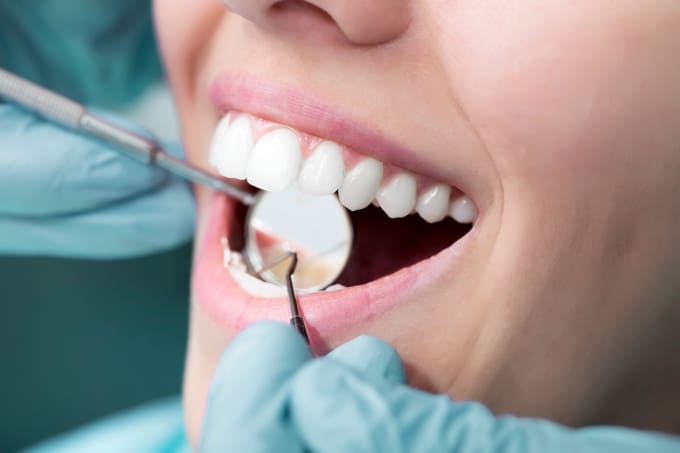What to Expect After Deep Cleaning of Teeth
If you are not meticulous about your daily brushing and flossing, you may need a dental deep cleaning. Even if you’re doing everything right, there may still come a time when you will need to undergo the procedure. Our dentists in Jupiter, FL are experts at deep cleaning your teeth. Before we lay out what to expect after a deep cleaning of teeth, let’s take a look at what might cause you to need it.
Why You Might Need a Deep Cleaning
Periodontitis
Gum disease is a possibly serious, progressive condition that involves bacterial infection of your gums and surrounding bones. Research has shown that almost one-third of the population might be innately disposed to gum disease, although other factors frequently trigger it.

Some can be prevented while others can’t be. It includes hormone fluctuations experienced during puberty, pregnancy, or menopause. The triggers that can be preventable include tobacco use. It lets plaque and tartar to build up on your teeth. Tartar is the most common source of periodontitis.
Plaque is being continuously formed, and if it stays on the teeth, it can harden into tartar and irritate your gums. Tartar is more problematic to remove than plaque, and it also emits bacterial toxins that break down the adjacent gum tissues. The gums begin to separate from the teeth, creating gum pockets beneath your gum line. If your plaque and tartar are not promptly removed, it will result in gum degradation and infection.
Tooth Loss
Periodontitis can cause tooth loss and affect your overall health if left untreated. It has also been linked to some cardiovascular conditions. Regrettably, early gum disease may go unnoticed. If you think you have gum problems, we will physically assess your gums for puffiness, redness, and bleeding, which shows gum inflammation.
We use a periodontal probe to determine how severe your gum condition is through measuring the depths, of the gum pockets between your teeth and gums. If pocket depths are greater than three millimeters, there exists periodontal disease. We will also assess your tooth mobility. Loose tooth strongly indicates a loss of bone support from gum disease.
We may perform a series of x-rays to confirm any bone loss. Luckily, deep dental cleaning can remove plaque buildup and prevent periodontitis from occurring or progressing. The procedure includes root planing and scaling, and are usually utilized to manage early-stage gum disease.
Deep Dental Cleaning Techniques
Scaling – The process by which we scrape off the plaque and tartar buildup on the surfaces of your teeth. Generally, we perform the scraping by hand, but we also combine manual scraping with an ultrasonic scaler to significantly speed up the process when the accumulation is excessive.
Root Planing – It is the second part of deep cleaning. It involves manually cleaning out the gum pockets of plaque. The root surfaces of your teeth are smoothed over after the pockets are cleaned out. It lets the gum tissue heal and reduces the likelihood of future plaque buildup.
Depending on the level of the condition, more than one treatment might be needed. Root planing is slightly more invasive than a regular prophylactic dental cleaning. However, any possible discomfort can be managed with local anesthesia.
The procedure seeks to remove cementum and is completed on the roots of your teeth that show bone loss with tissue recession. It thoroughly cleans your teeth that have been contaminated with damaging bacteria. This treatment may be sufficient in controlling progressing gum disease depending on the extent of the damage.
When utilized together, the two parts of deep dental cleaning can stop the development of mild to moderate periodontitis. We may also prescribe antibiotics to control any underlying bacterial infection. In severe cases of gum disease, periodontal surgery may be needed.
Even after a successful deep cleaning, good daily oral hygiene should remain your top priority. Brush and floss twice a day to keep your teeth plaque-free. Dentist visits every six months are also essential to prevent the recurrence or worsening of gum disease.
Symptoms to Look Out For
Gum disease may be asymptomatic in its early stages, but visit us as soon as possible for deep cleaning if you observe any of the following symptoms:
- Changes in your bite
- Loose tooth
- Unpleasant breath
- Gums separating from your teeth
- Presence of pus between teeth and gum
- Changes in the fit of partial dentures
- Swollen, reddened, bleeding, or tender gums, especially when you’re brushing your teeth
Contact Shoreline Smiles
Practicing proper oral hygiene is vital, but deep cleaning is key to averting the manifestation or deteriorating of gum disease. If you want to learn more about deep cleaning in Jupiter, FL, feel free to contact us and we’ll answer all of your questions





